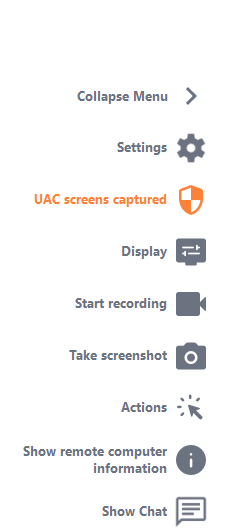Interact with the Remote Session
When connecting remotely using the “Remote Control” access mode, information and administrative tools are available in the bar at the top of the shared screen.
This bar can be detached from the screen by clicking the Detach button.
Overview of the tools available to support agents:

Settings
From the Settings tab, you can enable or disable the following modes:
- Debug Mode
- Direct Connection
- Clipboard Synchronization (CTRL+C/V)
- UAC Screen Capture
Display
- Allows switching between screens for end users with multiple monitors.
- Change screen resolution
- Change video quality
- Adjust window
System
- Allows you to send System Administrator commands to restart or lock the session.
Files
- Allows you to send a file to the client computer.
This button is also visible in the client’s chat window to send you a file.
Run
- Allows you to send administrator commands automatically.
Record
- Allows you to record the session or take screenshots.
Chat
- Allows you to open the chat window and move it wherever you want.
Info
Remote Computer Information, indicates
- The Windows version
- RDP client
- Server name
- Number of screens
- Resolution
- Session user name
- Remote Support client version.
Detach
- Allows you to detach the control bar on your screen.
Fullscreen
- Allows you to display the control window in full screen.